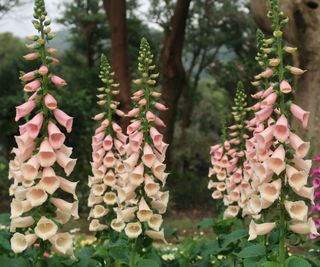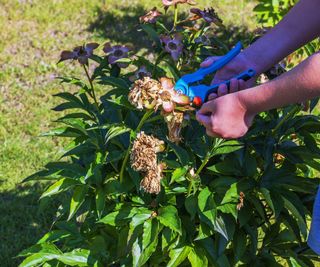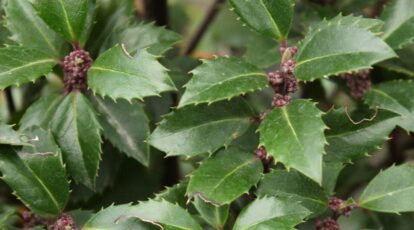Cottage gardens look delightfully informal, with a mix of perennials, annuals, and herbs spilling out of beds and over walkways. But, the seemingly casual mix of plants is backed by careful planning. It’s harder than it might seem to create a graceful cottage garden.
The challenge is even greater when you have shady areas. Try these shade-loving or shade-tolerant species and varieties to round out the more challenging corners of your charming cottage garden beds.
Choosing the Best Cottage Garden Plants for Shady Areas
Shade plants for a cottage garden should be considered as carefully as those that thrive in full sun. Consider the important elements of this particular style when considering shady cottage garden ideas: an informal layout, old-fashioned flowers, soft edges, and a variety of plant heights, textures, and colors.
Here are some examples of plants that either tolerate or do very well in partial to full shade and are excellent examples of the cottage garden type.
1. Foxglove (Digitalis purpurea)
(Image credit: `Andrea Jhang / 500px / Getty Images)
Foxglove is a classic English cottage garden plant. It produces tall (3 to 4 feet, or 0.9 to 1.2 m) stems covered in bold, bell-shaped blooms in shades of pink, purple, and white. Foxglove grows as a short-lived perennial in USDA zones 4 through 9 in full sun or partial shade. It flowers in early summer. The height of foxglove makes it a great centerpiece in beds or against walls and fences.
2. Cranesbill (Geranium sylvaticum)
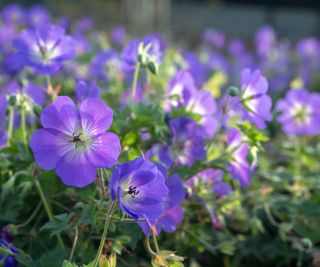
(Image credit: Iva Vagnerova / Getty Images)
Also known as woodland geranium, cranesbill is hardy in zones 4 through 9 and can grow well in partial shade. Don’t confuse this hardy species with annual geraniums. They are not the same plant. Cranesbill produces delicate flowers in a range of colors and with delicate veining. They grow in low clumps and do well in front of taller plants, along edges, and tucked in among other plants. Depending on the species, cranesbill blooms in spring, summer, or fall.
3. Phlox (Phlox spp.)
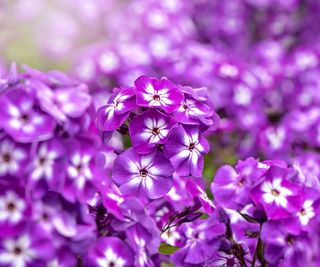
(Image credit: Jacky Parker Photography / Getty Images)
Phlox grows in low mounds, creating a colorful carpet of delicate flowers in shades of pink. It’s a romantic choice of part shade cottage garden plants. Use phlox along edges and let it spill into walkways and creep around other low-growing flowers. The flowers bloom prolifically from July to September. Grow phlox as a perennial in zones 4 through 8.
4. Lady’s Mantle (Alchemilla mollis)
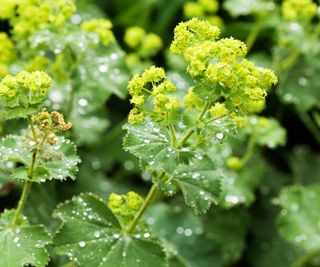
(Image credit: speakingtomato / Getty Images)
Lady’s mantle is an excellent example among old-fashioned cottage garden plants that like shade. Hardy in zones 3 through 8, this perennial has interesting foliage and flowers. The leaves are velvety soft, large, and lobed. Lady’s mantle flowers are clusters of small yellow or light green blooms that create a frothy effect. Grow in partial shade as a border or as ground cover.
5. Astilbe (Astilbe japonica)
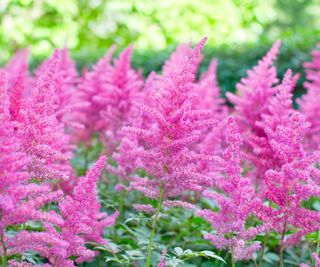
(Image credit: Julija Kumpinovica / Getty Images)
This unique looking perennial grows in zones 4 through 9. It tolerates partial or even full shade. It uniquely grows well under black walnut trees, an area of the garden not all plants tolerate. Astilbe blooms in late spring and early summer. The flowers are feathery plumes that grow among fern-like leaves. Grow astilbe in your shadiest spots and woodland beds.
6. Columbine (Aquilegia canadensis)
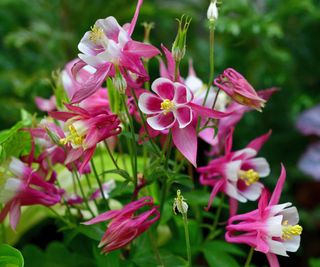
(Image credit: Photos from Japan, Asia and othe of the world / Getty Images)
Canadian columbine is a perennial native to North America. It is hardy over a wide area, from zone 2 through 9. The unique hanging flowers add a special touch to a cottage garden and bloom in spring. Mix columbine in with other flowering perennials in mixed beds or natural areas. Although the flowers are striking, the foliage looks nice throughout the summer and acts as a ground cover. Grow columbine in sun or partial shade.
7. Aster (Aster spp.)
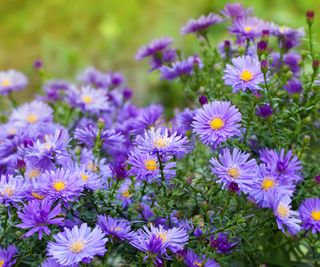
(Image credit: BoValentino / Getty Images)
Hundreds of species of aster give you plenty of choices for a daisy-like flower for your cottage garden. Many of them grow best in partial shade and grow in low to medium clumps. Most asters bloom in late summer or even in fall. New England aster provides pretty blue flowers well into the fall. Asters are hardy in zones 4 through 8. Grow asters along borders and paths.
8. Corydalis (Corydalis lutea)
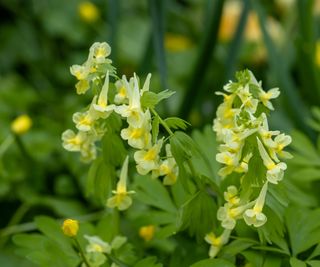
(Image credit: Olga Seifutdinova / Getty Images)
For a splash of cheery yellow, grow this corydalis as a groundcover or along edges. It tolerates even heavy shade, so this is a good option for your trickiest spots. Corydalis is hardy in zones 5 to 7. It grows in low mounds with fern-like foliage and small yellow flowers that bloom from spring through fall.
Frequently Asked Questions
What Are Key Colors for a Cottage Garden?
The best colors for a cottage garden are romantic and soft: pale pinks, blues, and lavenders. Add white and soft yellows, but avoid very bright or dark colors.
Which Cottage Garden Plants Don’t Work Well in Shade?
Some classic cottage garden plants that do not tolerate shade very well include roses, peonies, hollyhocks, lavender, cosmos, and sweet peas.


